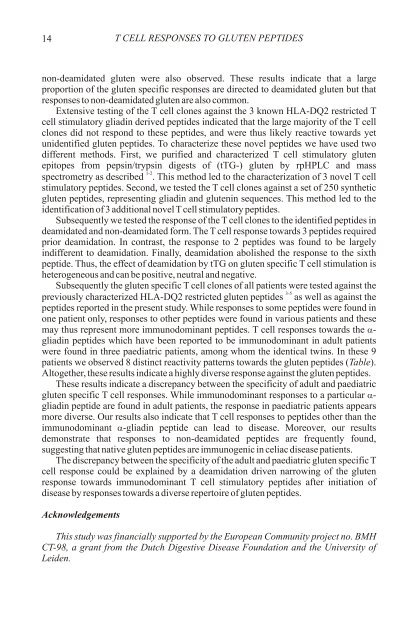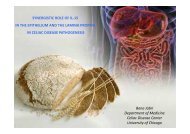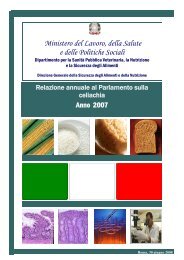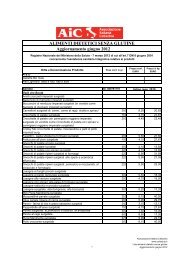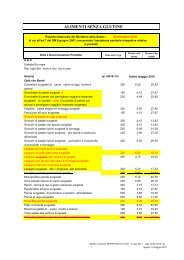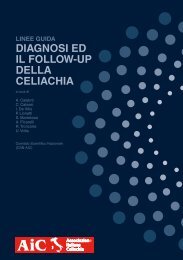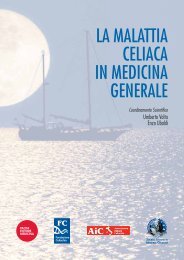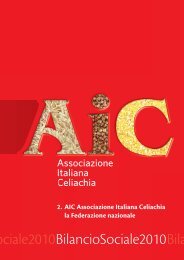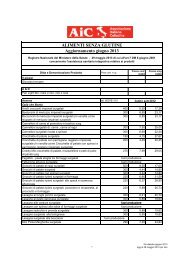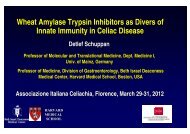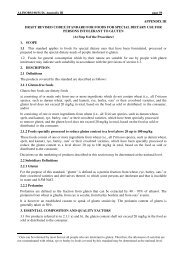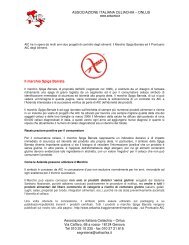primary prevention of coeliac disease - Associazione Italiana ...
primary prevention of coeliac disease - Associazione Italiana ...
primary prevention of coeliac disease - Associazione Italiana ...
You also want an ePaper? Increase the reach of your titles
YUMPU automatically turns print PDFs into web optimized ePapers that Google loves.
14<br />
T CELL RESPONSES TO GLUTEN PEPTIDES<br />
non-deamidated gluten were also observed. These results indicate that a large<br />
proportion <strong>of</strong> the gluten specific responses are directed to deamidated gluten but that<br />
responses to non-deamidated gluten are also common.<br />
Extensive testing <strong>of</strong> the T cell clones against the 3 known HLA-DQ2 restricted T<br />
cell stimulatory gliadin derived peptides indicated that the large majority <strong>of</strong> the T cell<br />
clones did not respond to these peptides, and were thus likely reactive towards yet<br />
unidentified gluten peptides. To characterize these novel peptides we have used two<br />
different methods. First, we purified and characterized T cell stimulatory gluten<br />
epitopes from pepsin/trypsin digests <strong>of</strong> (tTG-) gluten by rpHPLC and mass<br />
1-2<br />
spectrometry as described . This method led to the characterization <strong>of</strong> 3 novel T cell<br />
stimulatory peptides. Second, we tested the T cell clones against a set <strong>of</strong> 250 synthetic<br />
gluten peptides, representing gliadin and glutenin sequences. This method led to the<br />
identification <strong>of</strong> 3 additional novel T cell stimulatory peptides.<br />
Subsequently we tested the response <strong>of</strong> the T cell clones to the identified peptides in<br />
deamidated and non-deamidated form. The T cell response towards 3 peptides required<br />
prior deamidation. In contrast, the response to 2 peptides was found to be largely<br />
indifferent to deamidation. Finally, deamidation abolished the response to the sixth<br />
peptide. Thus, the effect <strong>of</strong> deamidation by tTG on gluten specific T cell stimulation is<br />
heterogeneous and can be positive, neutral and negative.<br />
Subsequently the gluten specific T cell clones <strong>of</strong> all patients were tested against the<br />
3-5<br />
previously characterized HLA-DQ2 restricted gluten peptides as well as against the<br />
peptides reported in the present study. While responses to some peptides were found in<br />
one patient only, responses to other peptides were found in various patients and these<br />
may thus represent more immunodominant peptides. T cell responses towards the a-<br />
gliadin peptides which have been reported to be immunodominant in adult patients<br />
were found in three paediatric patients, among whom the identical twins. In these 9<br />
patients we observed 8 distinct reactivity patterns towards the gluten peptides (Table).<br />
Altogether, these results indicate a highly diverse response against the gluten peptides.<br />
These results indicate a discrepancy between the specificity <strong>of</strong> adult and paediatric<br />
gluten specific T cell responses. While immunodominant responses to a particular a-<br />
gliadin peptide are found in adult patients, the response in paediatric patients appears<br />
more diverse. Our results also indicate that T cell responses to peptides other than the<br />
immunodominant a-gliadin peptide can lead to <strong>disease</strong>. Moreover, our results<br />
demonstrate that responses to non-deamidated peptides are frequently found,<br />
suggesting that native gluten peptides are immunogenic in celiac <strong>disease</strong> patients.<br />
The discrepancy between the specificity <strong>of</strong> the adult and paediatric gluten specific T<br />
cell response could be explained by a deamidation driven narrowing <strong>of</strong> the gluten<br />
response towards immunodominant T cell stimulatory peptides after initiation <strong>of</strong><br />
<strong>disease</strong> by responses towards a diverse repertoire <strong>of</strong> gluten peptides.<br />
Acknowledgements<br />
This study was financially supported by the European Community project no. BMH<br />
CT-98, a grant from the Dutch Digestive Disease Foundation and the University <strong>of</strong><br />
Leiden.


